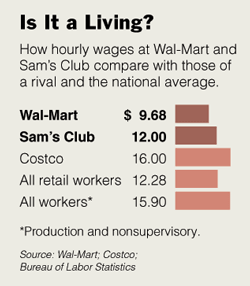The nation's largest private employer is rolling out an average pay increase of 6% for new hires at 1,200 Wal-Mart and Sam's Club warehouse stores nationwide, including some of its nearly 200 stores in California.This is in spite of the fact that Wal-Mart has long claimed that it cannot afford higher wages for its employees. However, you do not want to remain a shelf stocker, greeter or cashier forever. The new policy also means move up in the ranks or your salary remains stagnant.
Wal-Mart is instituting the salary caps to encourage workers to move up through the ranks rather than remain in the same job for years. Employees who earn more than the maximum amount for their job won't see a salary decrease but will no longer be entitled to raises unless they change positions.Heavy criticism of Wal-Mart and loss of 8% of its customers may actually be making Wal-Mart re-think its business strategy.
The announcement by Wal-Mart comes as the company continues its battles against legislative oversight of how it treats workers.
 2005 Data
2005 DataWal-Mart profit margin 3.6%
Costco profit margin 1.9%
BusinessWeek ran through the numbers from each company to compare Costco and Sam's Club, the Wal-Mart warehouse unit that competes directly with Costco. We found that by compensating employees generously to motivate and retain good workers, one-fifth of whom are unionized, Costco gets lower turnover and higher productivity. Combined with a smart business strategy that sells a mix of higher-margin products to more affluent customers, Costco actually keeps its labor costs lower than Wal-Mart's as a percentage of sales, and its 68,000 hourly workers in the U.S. sell more per square foot. Put another way, the 102,000 Sam's employees in the U.S. generated some $35 billion in sales last year, while Costco did $34 billion with one-third fewer employees.
Yet the cheap-labor model turns out to be costly in many ways. It can fuel poverty and related social ills and dump costs on other companies and taxpayers, who indirectly pick up the health-care tab for all the workers not insured by their parsimonious employers. What's more, the low-wage approach cuts into consumer spending and, potentially, economic growth. "You can't have every company adopt a Wal-Mart strategy. It isn't sustainable," says Rutgers University management professor Eileen Appelbaum
1 comment:
Somebody PLEASE write a new letter to the ADE using these facts - I have already written several and can't keep putting my name in the paper. We need to continue to hammer on FACTS that bring to light WM's lousy ethics. No one can argue with facts. Write letters to the editor and to the village board!
Post a Comment